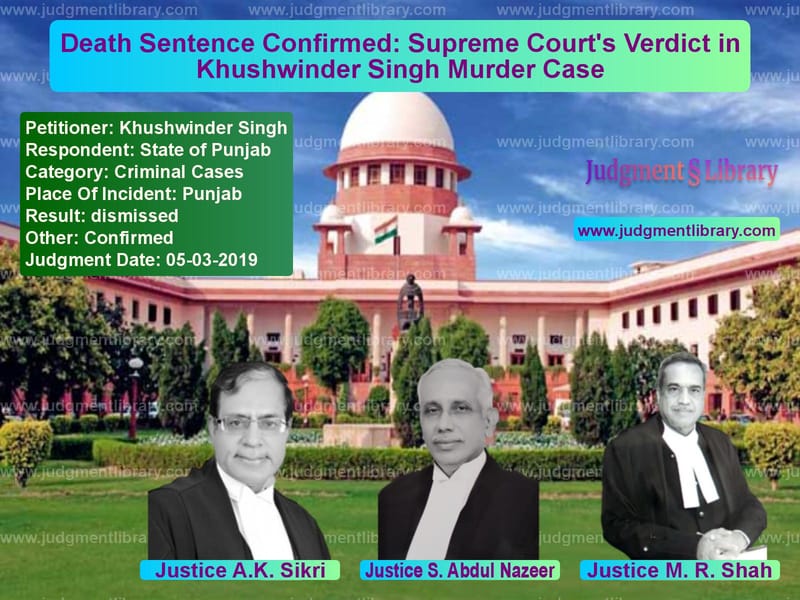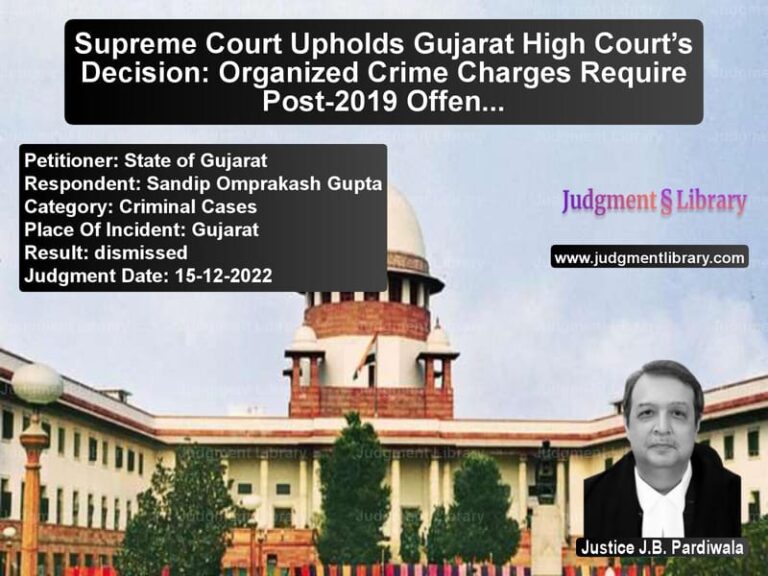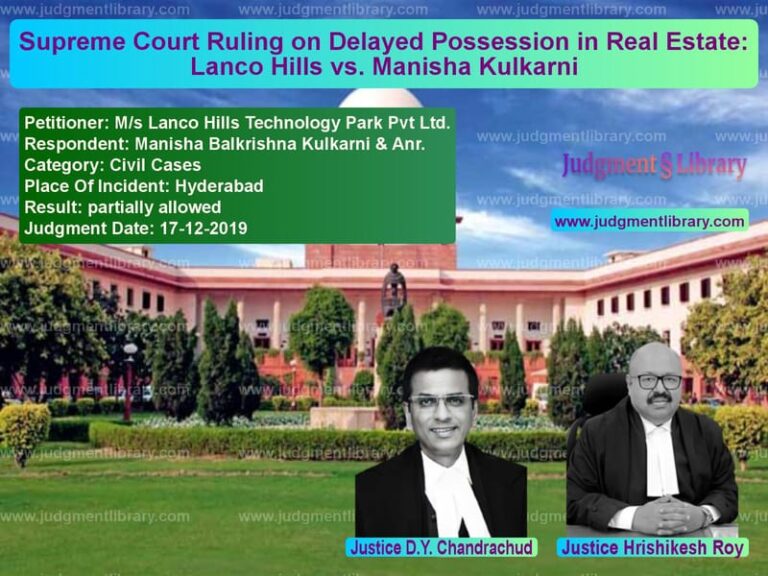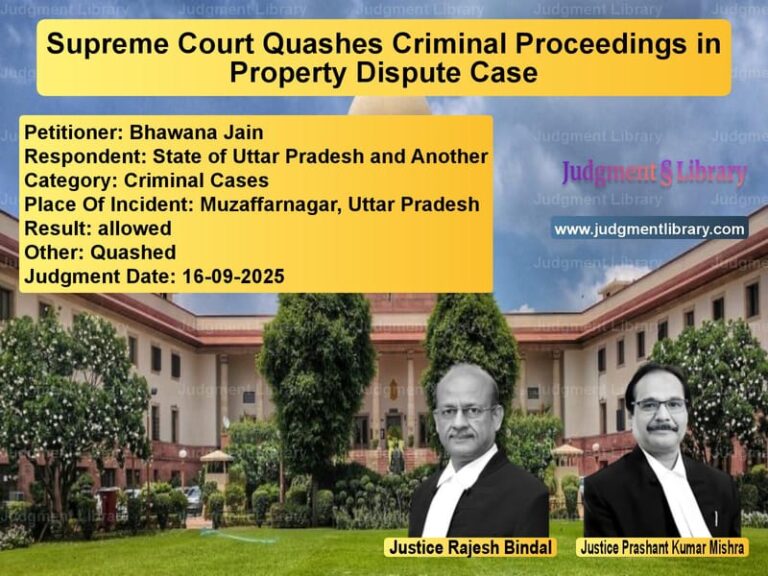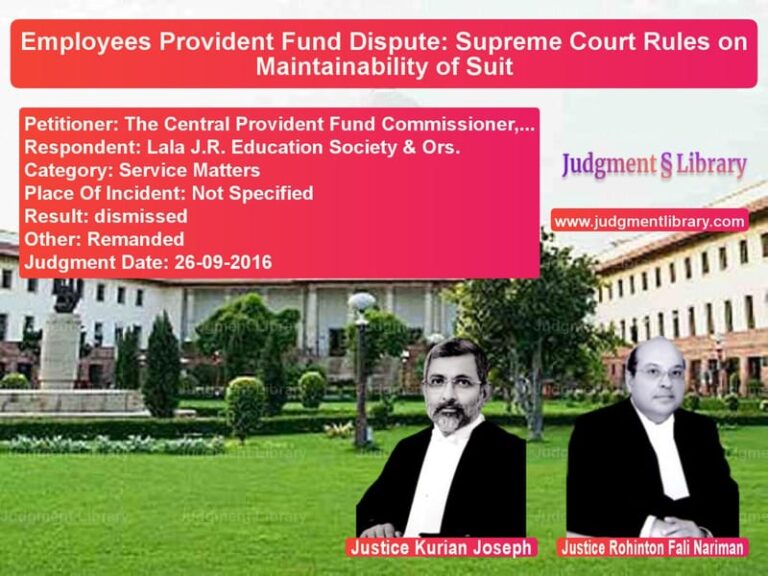Death Sentence Confirmed: Supreme Court’s Verdict in Khushwinder Singh Murder Case
The case of Khushwinder Singh vs. State of Punjab is a significant example of the Supreme Court of India’s approach to capital punishment. The case involved the brutal murder of six individuals, including children, by the appellant Khushwinder Singh. This judgment sheds light on the principles governing the awarding of the death penalty in cases falling within the ‘rarest of rare’ doctrine.
The appellant challenged the decision of the Punjab and Haryana High Court, which had upheld the Sessions Court’s verdict imposing the death penalty for the murders. The Supreme Court examined the circumstances surrounding the crime, the evidence presented, and the legal arguments before confirming the conviction and death sentence.
Background of the Case
The case originated from a tragic incident that took place on June 26, 2012. The complainant, Jasmeen Kaur, reported that her family had been deceived by the accused, Khushwinder Singh, into believing that a ‘Baba’ (a holy man) could help her brother overcome his alcohol addiction. The accused also promised to help her husband, Rupinder Singh, secure an opportunity to move abroad.
On the pretext of performing a religious ritual, Khushwinder Singh took multiple members of Jasmeen Kaur’s family, including her mother, father, brother, husband, and two young children, in his car. He later pushed them into a canal, leading to their deaths. Jasmeen Kaur was also thrown into the canal but survived.
Prosecution’s Allegations
The prosecution contended that Khushwinder Singh planned the murders meticulously for financial gain. He was aware that Jasmeen Kaur’s family had Rs. 37 lakh in their possession from the sale of their land. He first convinced them that he could send Rupinder Singh abroad and collected an advance sum of Rs. 2 lakh. Later, he deceived them into believing that a ritual was necessary to cure Gurinder Singh’s alcohol addiction.
As per the prosecution:
- The accused took the victims in two separate groups to a canal and pushed them into the water, ensuring that no one would survive to testify against him.
- He drugged some of the victims using sleeping pills before taking them to the location.
- After the murders, he looted the remaining Rs. 36.7 lakh and gold ornaments from the family’s house.
Defense Arguments
The accused argued that he was falsely implicated in the case. His counsel contended:
- The case was based on circumstantial evidence and lacked direct eyewitness testimony.
- There were inconsistencies in the prosecution’s version of events, particularly regarding the timing of the FIR and the recovery of stolen money and jewelry.
- Jasmeen Kaur’s testimony was unreliable since she was the sole surviving witness.
- There was no direct forensic evidence linking the accused to the crime.
Supreme Court’s Observations
The Supreme Court, after analyzing the evidence, concluded that:
- Jasmeen Kaur’s testimony was credible and consistent with the facts of the case.
- The accused had a clear motive—financial gain.
- The accused had been last seen with the deceased before their deaths.
- Recovery of the stolen money and jewelry from the accused’s house was strong corroborative evidence.
- The manner of execution—deceit, drugging, and drowning—showed extreme cruelty and premeditation.
Legal Reasoning and Judgment
The Supreme Court reaffirmed that capital punishment should be imposed in cases that fall within the ‘rarest of rare’ category. The Court cited precedents such as:
- “Mukesh v. State (NCT of Delhi)” (2017), where capital punishment was upheld for a brutal and premeditated crime.
- “Bachan Singh v. State of Punjab” (1980), which laid down the principle that the death penalty should be reserved for cases where the alternative of life imprisonment is unquestionably inadequate.
The Court stated:
“The accused has killed six innocent persons, including children, in a pre-planned manner. He first kidnapped three persons and threw them into the canal, then returned to eliminate the remaining family members. This crime is committed with extreme brutality, and the collective conscience of society would be shocked. The aggravating circumstances far outweigh any mitigating factors.”
Accordingly, the Supreme Court confirmed the conviction and the death sentence awarded by the lower courts.
Key Takeaways from the Judgment
- The death penalty is justified in cases where the crime is exceptionally brutal and premeditated.
- Recovery of stolen money and jewelry can serve as strong corroborative evidence in murder cases.
- The ‘last seen together’ doctrine plays a crucial role in cases based on circumstantial evidence.
- Courts take into account the social impact of heinous crimes when deciding on capital punishment.
Conclusion
The Supreme Court’s judgment in this case reiterates the principle that the most severe punishments should be reserved for the most grievous crimes. The judgment upholds justice for the victims and sets a precedent for future cases where multiple murders are committed with premeditation and cruelty.
Petitioner Name: Khushwinder Singh.Respondent Name: State of Punjab.Judgment By: Justice A.K. Sikri, Justice S. Abdul Nazeer, Justice M. R. Shah.Place Of Incident: Punjab.Judgment Date: 05-03-2019.
Don’t miss out on the full details! Download the complete judgment in PDF format below and gain valuable insights instantly!
Download Judgment: Khushwinder Singh vs State of Punjab Supreme Court of India Judgment Dated 05-03-2019.pdf
Direct Downlaod Judgment: Direct downlaod this Judgment
See all petitions in Murder Cases
See all petitions in Bail and Anticipatory Bail
See all petitions in Extortion and Blackmail
See all petitions in Judgment by A.K. Sikri
See all petitions in Judgment by S. Abdul Nazeer
See all petitions in Judgment by Mukeshkumar Rasikbhai Shah
See all petitions in dismissed
See all petitions in Confirmed
See all petitions in supreme court of India judgments March 2019
See all petitions in 2019 judgments
See all posts in Criminal Cases Category
See all allowed petitions in Criminal Cases Category
See all Dismissed petitions in Criminal Cases Category
See all partially allowed petitions in Criminal Cases Category

